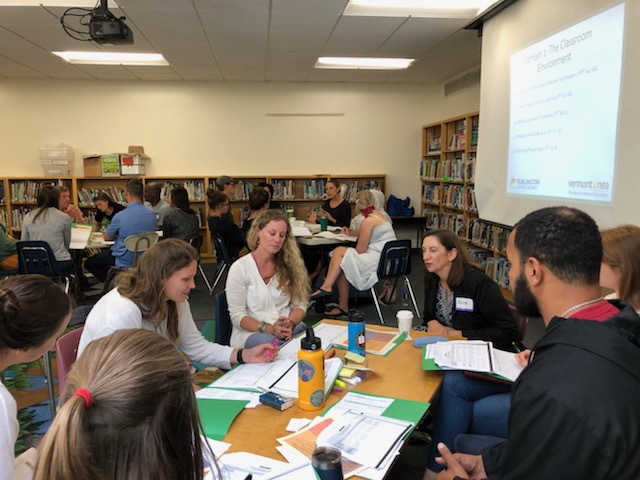In May 2021, we began working with the Center for Innovative Education to support the development of our strategic plan. Their work is supporting us with our equity focus on:

- Including and working side by side with families and learners farthest from opportunity in our community
- Rethinking how we will be accountable to one another in our strategic plan
- Balancing learning and action as we do this important work together and in our plans for the future
The goal of our strategic planning process will be to utilize a process of “radical inclusion” to help us mobilize a broad Coalition representative of Burlington’s diversity of backgrounds and perspectives. This means making extra effort to reach out to marginalized communities to ensure participation, creating an open application by which people may apply, and rounding out our Coalition with a randomly selected cross-section of the Burlington community. By using this radically inclusive process, we will ensure that all stakeholder groups are represented and able to bring their essential perspectives and many kinds of expertise to shape our strategic planning work and the future of Burlington School District.
Strategic Planning Phases and Timeline
Phase 1 (June-July): Forming the Coalition and collecting data and insights via empathy interviewing
Phase 2 (August): Launching the Coalition and co-creating the vision for the district
Phase 3 (September-October): Defining key priorities, strategies, and areas for shared learning
Phase 4 (November): Finalizing the plan with full board collaboration
Our next step in this process is to create what we are calling the Burlington Education Coalition. The goal of this coalition is to help shape the work of our strategic planning and, ultimately, the strategic direction of our district. Our process of “radical inclusion” will ensure this coalition is representative of Burlington’s diversity of backgrounds and perspectives. This means making extra effort to reach out to marginalized communities to ensure participation, creating an open application by which people may apply, and rounding out our Coalition with a randomly selected cross-section of the Burlington community.
Coalition members will join to make sense of empathy interview data, create a report about the current state of education, develop a vision for the future, and generate the district’s strategic plan. To accomplish this, members will join our empathy interviewing team and conduct interviews in July and early August. Members will also meet regularly in August and engage in both in-person and remote work through September and October. Coalition members who are guardians and community members will be eligible for an honorarium (payment) for their participation.
While the deadline to apply to join the coalition closed on June 25, if you are interested, please contact Victor Prussack at vprussac@bsdvd.org. More information about this work, including the exact dates of in-person meetings, can be found below.
Coalition Membership and Responsibilities
Coalition Membership
| First Name | Last Name | Role)s) |
| Balkisa | Omar | Alum/Community |
| Martine | Gulick | Board |
| Sherwood | Smith | Community |
| Vicky | Smith | Community |
| Anna | Telensky | Family |
| Chong Ho | Kim | Family |
| Cinthia | Javier Quittner | Family |
| Emma | Kouri | Family |
| Kathlin | Bibens | Family |
| Katie | Revelle | Family |
| Scarlett | duncan | Family |
| Shanta | Eastman | Family |
| almina | kadric | Family |
| Maya | Moore | Family |
| Shelly | Waterman | Family/Staff |
| Amy | King | Family/Staff |
| Zaharo | Adan | Family/Staff |
| Allison | Collins | Staff |
| Heidi | Brown | Staff |
| Beth | Fialko-Casey | Staff |
| Jocelyn | Fletcher-Sheuch | Staff |
| Bonnie | Johnson-Aten | Staff |
| Karyn | Vogel | Staff |
| Kevin | Robinson | Staff |
| Quaron | Pinckney | Staff |
| Henri | Sparks | Staff |
| Rosa | Kori | Student |
| Jillian | Angell | Student |
| Lily | Besaw | Student |
| Alexander | Gordon | Student |
| Batula | Mohamed | Student |
| Dieuna | Beynnon | Student |
| Nicole | Xie | Student |
| Sahra | Hassan | Student |
| Victoria | Tornwini | Student |
Coalition members will be expected to attend weekly in-person meetings in August on: August 9, 5:30 – 7:30 PM (Location TBD)
August 16, 5:30 – 7:30 PM (Location TBD)
August 23, 5:30 – 7:30 PM (Location TBD)
August 30, 5:30 – 7:30 PM (Location TBD)
Members should plan to conduct several empathy interviews prior to the first meeting on August 9. This will require reaching out to students, caregivers, educators, and community members to gain insights, as well as attending training on how to conduct these. If you wish to lead some empathy interviews, please sign up here.
Empathy Interview Training Date: July 15, 5:30-7:00 PM (Location TBD)
Make-up Date: July 27, 5:30-7:00 PM (Location TBD)
Members will also engage in some shared work through September and October, through a mix of in-person and virtual meetings as well as some work done on their own time. Coalition members who are guardians and community members will be eligible for an honorarium (payment) for their participation.
We look forward to starting this work with you in the spirit of partnership and co-creation. If you have questions about the strategic planning process, please feel free to reach out to Victor Prussack, Coordinator of the Office of Engagement, at vprussac@bsdvt.org.

